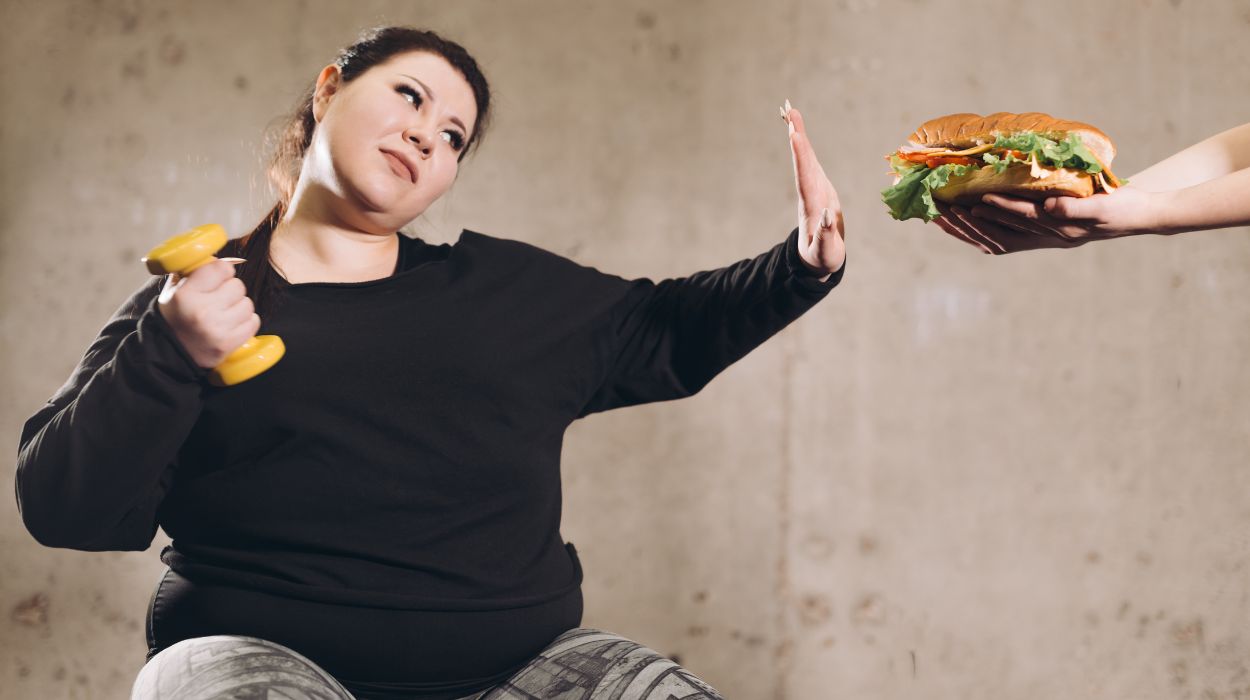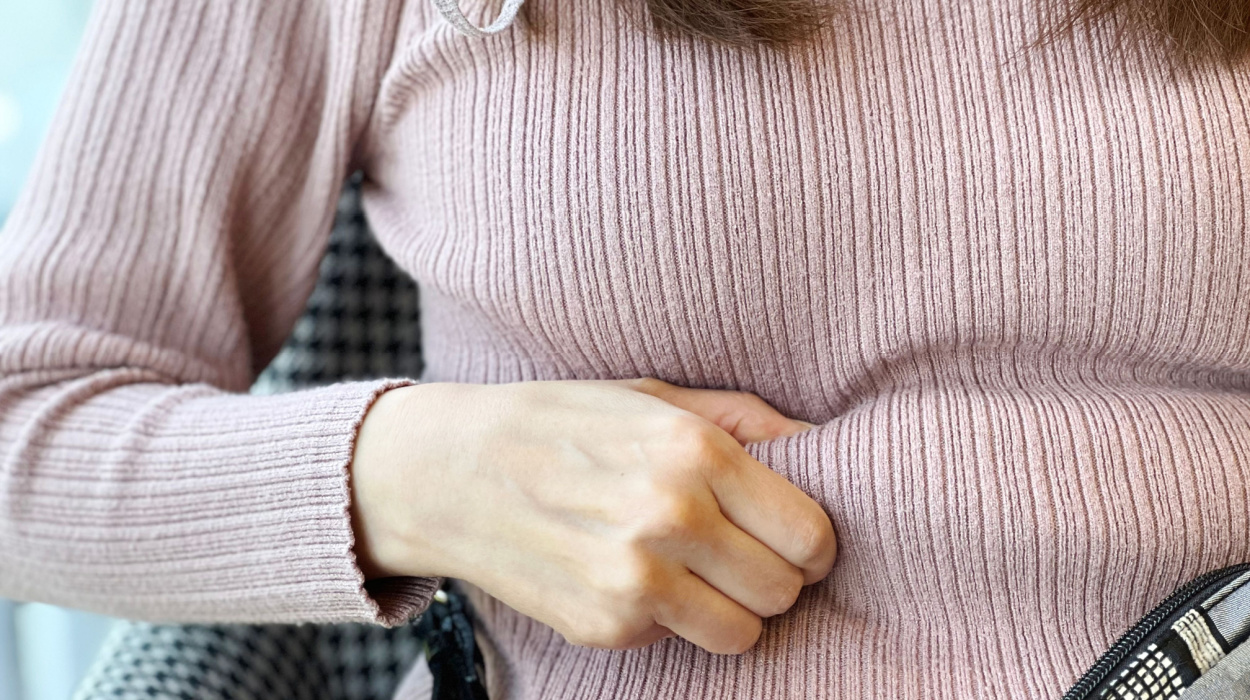Upper belly fat is often stubborn and frustrating to shed. It can be a major obstacle to your fat-loss journey. With the right approach, achieving a leaner upper body is well within reach. If you’ve been working on losing weight and improving your physique, you’ve probably wondered how to lose upper belly fat quickly. In this article, we’ll look at six methods to reduce your upper abdominal fat.
6 Ways To Lose Upper Belly Fat
There are six great ways to lose upper belly fat:
- Eating a calorie-restricted diet.
- Doing cardio exercises.
- Hydrating regularly.
- Getting enough sleep.
- Reducing consumption of sugary drinks.
- Stress management.
6 Best Ways To Get Rid Of Stubborn Upper Belly Fat

Usually, when you start a diet and exercise, you’ll lose weight and look fit quickly. However, sometimes you may have excess fat on parts like the upper belly that just won’t go away.
Fortunately, there are a few things that you can do to lose belly fat. While you won’t lose weight overnight, the tips below can make subcutaneous fat on your belly disappear more quickly.
Watch Your Diet
What you eat usually determines your weight gain. If you have a terrible diet, fat may significantly accumulate around your body, including excess upper belly fat.
If you are determined to lose belly fat, stick to a healthy diet. Having a diet of every food group and in the right proportions gives your body all the nutrients it needs to stay healthy while also allowing you to lose weight sustainably.
Below are a few important dietary changes that’ll help you reduce belly fat:
Eat Fiber-Rich Foods
How much do you think of your food’s dietary fiber content when dieting? Probably not a lot, right?
People often focus on calories, forgetting that fiber is vital in weight regulation.[1] Dietary fiber and whole grains improve satiety (being full), which can help you reduce the calories you eat.
Fiber also has a significant role in energy balance.[2] Eating a diet that is rich in fiber content will reduce excessive energy intake, which is linked with weight gain.[3]
Don’t Eat Too Much Salt
Salt is an essential ingredient that you use in most meals. However, while salt makes the food taste better, overeating can accumulate fat in your upper belly.
Sometimes, excess belly fat is caused by water weight. Eating salt-rich dishes can dehydrate you and promote water retention. This makes you gain water weight.[4]
Always limit yourself to one tablespoon of salt[5] a day to avoid dehydrating yourself and gaining water weight. You should also consider not eating many high-salt foods in one day.
Eat Foods That Beat Stress
As weird as it sounds, some types of foods are better for your mental health than others. For example, Vitamin C has been known to help with stress relief.
Instead of making a chocolate-filled dessert, you can eat a banana and keep your mood swings in check. You can also add eggs to your diet because they’re rich in serotonin,[6] a chemical that makes you happier and more fulfilled.
Balance Between A Diet And Quitting Cigarettes
Smoking is probably the most frowned-upon habit in medicine. Besides being associated with several types of cancer, it can also promote weight gain. Specifically, smoking cigarettes causes fat build-up on your belly[7] but not overall fatness.
While most people are familiar with the dangers of smoking, few smokers can quit successfully. This is because it takes an average of six attempts[8] for a long-term smoker to give up the habit completely.
Quitting a habit as addictive as smoking is definitely challenging and needs a determined approach to succeed. It also doesn’t help that some people gain weight[9] immediately after quitting cigarettes.
So, if you’re a smoker, combine your smoking cessation with other weight loss efforts like exercises and a healthy diet.
Manage Your Stress
Have you ever heard of a “stress belly?” Unknown to many people, stress can promote abdominal fat. There’s a strong relationship between high stress levels and cortisol secretion.[10] Cortisol is a hormone associated with fat distribution, especially in the abdomen.
Stress also often triggers emotional eating,[11] which can increase your daily calorie intake. This eventually increases your upper belly fat.
Find healthy ways to manage your stress, like meditation, yoga, deep breathing, and getting enough sleep. This will not only help you reduce your belly fat but also contribute to your overall wellness.
Hydrate
Drinking water is an often overlooked but significant way to lose upper belly fat. While it might not target belly fat directly, it’s a great way to speed up weight loss.
Hydration helps your body get rid of water weight. This is excess water retained by the body, often due to dehydration. It makes your body bloat, making you look like you have fat accumulation on parts like your upper belly.
Dehydration can lead the body to retain more water as a survival mechanism. When you maintain proper hydration levels, your body is less likely to hold onto excess water. This results in a leaner appearance and reduced bloating around the upper stomach area.
Whether you are trying to achieve a slimmer appearance or enhance the effectiveness of your weight loss efforts, drinking enough water is a simple yet powerful tool in your arsenal.
Work Out A High-Calorie Deficit Routine
If you hang around gym trainers, you’ll probably hear the words calorie deficit get tossed around. While it sounds complicated, it simply means the number of calories you lose compared to the ones you lose.
For example, if you eat an acai bowl[12] with 99 calories and run on the treadmill for 30 minutes burning 250 calories, you’ll have a calorie deficit of 151.
Therefore, to burn excess fat in your upper belly region, you need to have a high-calorie deficit. As you plan your belly fat loss strategy, find the best diet for a high-calorie deficit[13] and determine which exercises will help you burn the most calories.
Get Some Sleep
Sleeping is something we often disregard, especially in today’s hyperactive world. Recent statistics[14] show that nearly 30% of adults don’t get seven hours of sleep every night.
Lack of sleep is dangerous not only for your physical but also for your mental health. If you don’t get enough sleep, you’re more likely to be stressed,[15] which is one of the hindrances of reducing upper abdominal fat accumulation.
Sleep also plays a vital role in metabolism, hormonal balance,[16] and upper abdominal weight gain. If you don’t sleep enough, you’ll likely gain weight and accumulate visceral fat.
It’s essential to get at least seven hours of sleep every night to give your body time to rest and complete the physiological processes that happen when you’re in dreamland.
If you have trouble sleeping or staying asleep all night, you can try Cognitive Behavioral Therapy.[17] This includes switching off all electronic devices half an hour before bed, setting a regular sleeping schedule, and avoiding alcohol or coffee before you sleep.
Upper Belly Fat Causes

It’s essential to know the cause of fat accumulation in your upper belly to make healthier choices. Here are some of the main things that will give you stubborn upper belly fat:
Stress
Do you have crazy deadlines at work, pending bills, or relationship problems? They might be responsible for your bloated upper belly.
Stressful situations cause your body to produce increased cortisol,[18] which then causes excessive sugar production in your liver. This often results in visceral fat buildup.
Old Age
Growing old is an inevitable reality we all must deal with, and sometimes it comes with many challenges. As you age, your body loses subcutaneous fat[19] (the fat under your skin) and gains visceral fat. This can give you a bulging upper belly.
A Bad Diet
We all enjoy tasty fried food and sweet snacks. From chicken patty burgers and spicy wings to cheesy pizzas, the list of mouthwatering foods is endless.
However, most of these foods are often unhealthy because they have more calories than your body needs. Whenever you enjoy these delicious delights, you reduce your calorie deficit for the day. Eventually, this will accumulate fat on your upper belly and cause a larger waist.
Strive to exclude junk food, begin counting calories to stay on a calorie-deficit diet, pack up your sedentary lifestyle in favor of a yoga mat or strength training, and begin work on that upper abdominal region!
Summary
While some of the things that cause upper belly fat are beyond your control, like aging and genetics, there are still some things you can do to get a perfectly flat tummy.
Diet and exercise are the most important things to consider when burning excess fat. So, eat right and ensure a high-calorie deficit at the end of each day.
Also, manage your stress levels by getting enough sleep, using relaxation techniques, and living a balanced lifestyle. By combining these strategies, you can start your fat-loss journey and lose upper belly fat successfully.
Frequently Asked Questions
Upper belly fat is caused by various factors, including genetics, aging, and hormonal changes. However, the most common upper belly fat cause is a poor diet.
The upper belly fat is called visceral fat. It accumulates around the internal organs in the abdomen and can pose serious health risks.
The best way to lose upper belly fat quickly is by changing your diet to include more fruits, vegetables, lean proteins, and whole grains while avoiding processed foods and sugary drinks.
While it’s not possible to lose weight overnight, you can use weight loss herbs to reach your weight loss goals faster.
 Evidence Based
Evidence Based

